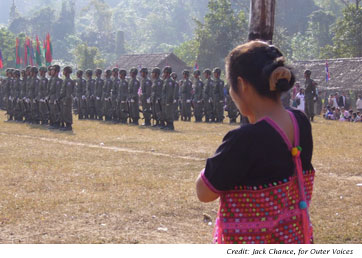
 (WOMENSENEWS)–A few weeks ago, Secretary of State Hillary Clinton’s office said it would change strategy on Burma, backing off U.S. economic sanctions of Burma in favor of "engagement" with the military regime, which calls the country Myanmar.
(WOMENSENEWS)–A few weeks ago, Secretary of State Hillary Clinton’s office said it would change strategy on Burma, backing off U.S. economic sanctions of Burma in favor of "engagement" with the military regime, which calls the country Myanmar.
Clinton is doing so with the support of Aung San Suu Kyi, the democratically-elected leader of Burma, who marked the 14th anniversary of her term of house arrest on Oct. 24.
As human rights organizations alternately express concern and hope about the new policy–hope that it could create the foundation for real stability in Burma–I can’t help recalling a plane trip I took last summer, when I was flying home from Bangkok to California.
I sat next to a young woman from Burma, or Myanmar, depending on which name you want to use.
As it turns out, this was her first trip ever outside her country. "Had I heard about Myanmar?" she asked me.
When I told her I knew about Aung San Suu Kyi she visibly recoiled and said "I’m not interested in anything political."
I changed the subject.
Later, as our dinner was served, she confided in a low voice, "I really love Aung San Suu Kyi."
I told her I could understand that.
Circling Back to Politics
We went on to talk about more personal topics, our families and lives back home. I answered her questions about life in the United States as best I could. She knew about President Lincoln. Then we discussed President Obama and soon we circled back to politics.
I picked up a copy of Asia Week from the magazine pocket of the seat in front of me. It fell open to a photograph of a crowd of Aung San Suu Kyi supporters staging a demonstration, all wearing masks bearing her image.
The young woman recoiled again. Eventually her wave of concern seemed to pass and she looked around the crowded plane. Finally she told me, "In Myanmar we are not even allowed to look at her picture. We will be put in jail if we are found with a picture of her."
She said that she sometimes discusses politics with her friends, "but we have to be very careful, because people get put in jail for talking about politics."
I told her that now that she was on a plane headed for the United States, and no longer in Myanmar, no one would do anything to her if she wanted to have an opinion. She nodded, but obviously was not completely ready to trust that idea–or me.
She told me she had never been in a place where she could express her opinions freely. I told her I have never lived somewhere where I wasn’t able to have opinions.
She had opened up as far as she felt she could. She went to sleep.
Asking Hard Questions
Reflecting on my conversation with the young woman from Burma posed some hard questions for me. If this woman’s family had enough money to send her to the U.S., then she must be from a very wealthy family. Yet even she is intimidated to speak about politics, much less consider entering politics herself.
Aung San Suu Kyi has shown unfathomable courage through years of house arrest, following the military coup that robbed her of a landslide victory as prime minister.
I want to think that women in Myanmar are inspired by this show of courage and not slowed down by the rulers who stand in the way of their freedoms.
But women in Burma, and Southeast Asia in general, have a difficult road ahead. Their countries are young democracies at best, some more truthfully dictatorships, muddied with deeply entrenched corruption. In most areas the education system is extremely limited. Too many women live in fear of speaking their minds, similar to that of my seatmate’s fears.
What are the options for a young woman in Burma? How can she begin to think of becoming a leader when Aung San Suu Kyi, her own leader, has been so forcefully, and effectively, silenced?
As the United States moves to engagement with Myanmar, it’s hard to be hopeful.
But last summer, Sam Rainsy, the leader of the Opposition Party in Cambodia, did give me hope. He told me that women, because of their firsthand experience of oppression, have a fundamental role in challenging dictatorships.
He called women "the spearhead of any fight to bring about democracy and restore human dignity." Let’s hope he’s right.
Stephanie Guyer-Stevens is executive producer of Outer Voices. She has been documenting female leaders in Southeast Asia and the Pacific Islands since 2003.
For more information:
Outer Voices
http://www.outervoices.org
BurmaNet News
http://www.burmanet.org
Note: Women’s eNews is not responsible for the content of external Internet sites and the contents of site the link points to may change.


